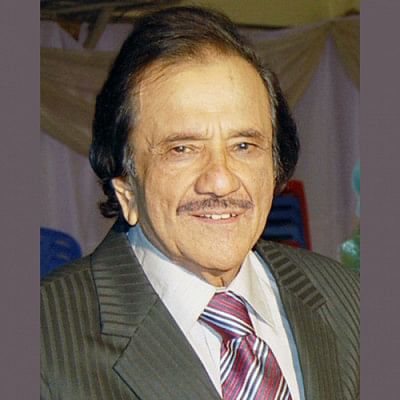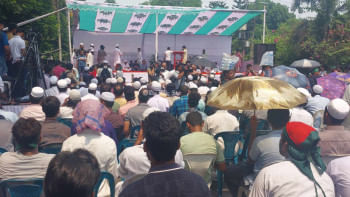Kamal Ziaul Islam: A legend in his own time

A titan, a legend, an iconoclast, a pioneer—these are some of the words that come to one's mind when recalling the memory of Kamal Ziaul Islam, popularly known as KZ Islam, who passed away on May 3, 2021. It is hard to accept that his charming personality and uplifting presence will no longer be a part of our lives. A charismatic figure, equally at ease with seniors, contemporaries and juniors, KZ Islam was the life of every gathering and his infectious optimism and ebullient personality would win him friends wherever he went.
KZ Islam's contributions to Bangladeshi cricket are well-known, and he had had many accolades and achievements, such as being the President of Bangladesh Cricket Control Board (presently Bangladesh Cricket Board), President of the Institute of Chartered Accountants of Bangladesh (ICAB), President of Gulshan Club, and so on. I will instead focus on his personal side, which is as fascinating as his public persona.
KZ Islam's story starts 86 years ago in Mymensingh, where he was born, one of eight siblings, of illustrious parents Khan Bahadur Sirajul Islam and Rahat Ara Begum. His mother was a renowned person in her own right—a writer of short stories in Urdu. At the age of 11, he was awarded a scholarship to the Royal Indian Military College in Dehradun, but due to the Partition of India, he went on to complete his schooling at Lawrence College at Murree, Pakistan (1947-52). He completed his education by getting a BSc in chemistry from Calcutta University (1955) and earned BCom (Hons) at the University of Leeds, UK, in 1960. After becoming a Chartered Accountant in 1962, he held a few positions in the UK and returned to Bangladesh in 1964.
He continued his professional life as a Chartered Accountant in various private and public institutions, and had a large circle of friends both in Dhaka and Chattogram. He was a leading socialite for many years and an accomplished singer. On many occasions, he would entertain family and friends with a large repertoire of songs.
In 1971, he moved to Dhaka from Chattogram and continued to serve in public-sector corporations. In 1976, he ventured into the world of business and was one of the pioneer entrepreneurs of Bangladesh, launching his own company called Nirman International Limited. It is in the name of this company that he later founded the Nirman School Cricket Tournament in 1982. Nirman was a construction firm that built the first 32-storied skyscraper in the country for Bangladesh Bank in 1985, and later diversified into projects overseas as well as project promotion and implementation in the power and telecom sector, property development and real estate, marble business, cold storage and so on.
The Nirman School Cricket Tournament was a result of the abiding interest KZ Islam had in the sport of cricket and his perennial optimism and confidence in the abilities of the youth of the country. He was the President of Ramblers Club from 1975 till he passed away, a club of enthusiasts who would play cricket on weekends for personal entertainment. He was always worried about the fact that there were not enough playgrounds for the youth to develop their sporting skills. KZ Islam's abiding faith in the youth led to his consistent personal support of cricket at a time when there was no professional or any form of organised cricket in the country.
He combined his love of cricket with philanthropy and decided to take it upon himself to develop and fund the sport of cricket for the youth of the country. The seeds that he sowed resulted in Bangladesh becoming a part of the international union of cricket champions. KZ Islam did not stop at cricket; he went on to contribute to the development of football in the country, being the Chairman of the Development Committee of Bangladesh Football Federation (2003).
KZ Islam's philanthropy extended beyond sports, and among the many projects he supported was Shishu Polli, an NGO for marginalised women, of which he was a patron.
One would have thought that being a professional Chartered Accountant, a pioneer entrepreneur and a philanthropist would have been enough, but not for KZ Islam whose creativity took yet another turn when he developed a serious interest in writing and scholarship. Starting with writing a column in the weekly Holiday on the great personalities of the world, which was later transformed into a book called Glimpses of the Great (2012), KZ Islam turned his attention to an event that has occupied many a great mind: the Partition of India.
Based on meticulous scholarship and painstaking in-person interviews of leading personalities still alive in South Asia and the UK, who wrote or were involved with the Partition, he wrote a voluminous book with a tentative title The Mountbattens and the Partition of India (to be published). In the book, he showed, using multiple original and secondary sources, that Mountbatten had a clear bias towards India and against Pakistan; in fact, an earlier title of his book was Mountbatten's India Bias.
In the view of KZ Islam, if not for Mountbatten being the Viceroy of India, the Partition of India would have been fair to both sides instead of being biased towards India. One may agree with or contest this rather momentous conclusion, but one cannot fault the scholarship that went into KZ Islam coming to this conclusion.
KZ Islam was sharp-witted, humorous, light-hearted, brilliant—a delightful and engaging person. His magnetic personality would win over all those who would come across him, and he was the first to help anyone whom he could, without any hesitation or expectations. During the Liberation War of 1971, he helped many people under very trying circumstances.
KZ Islam was a loyal member of his extended family, and being one of his nephews, I can vouch that for us he was a hero and a role model that we all tried to emulate. What intrigued me the most was how KZ Islam could manage to be so many different things with such felicity. He was always the bedrock of support for all family members. I remember on many occasions my late father would call KZ Islam at odd hours, and he would always find a willing helping hand in KZ Islam.
KZ Islam came from a deeply religious family, with many famous Islamic scholars amongst his ancestors. He was a religious person who had a firm belief in the tenets of Islam, and he practiced all the compulsory edicts. His practice of Islam was also a model for us, his extended family members, as we saw a thoroughly modern person effortlessly combining the practice of Islam with the contemporary world.
The recounting of the achievements of KZ Islam is to throw light on the many dimensions of his personality: professional, entrepreneurial, philanthropist, scholar, socialite, a religious person and a loyal family man. KZ Islam combined so many diverse dimensions into a meaningful life full of attainments, achievements, joys and struggles. He was a legend in his own time, and his legacy lives on. He leaves behind his wife and four sons.
One can only wish him well in his journey to the eternal life, with the conviction that all the good he has done to so many people and over so many years will stand him in good stead on his final journey. But his absence will be sorely felt, and his memories will remain with us.
Belal Ehsan Baaquie is a professor at the International Centre for Education in Islamic Finance, Malaysia.

 For all latest news, follow The Daily Star's Google News channel.
For all latest news, follow The Daily Star's Google News channel. 



Comments